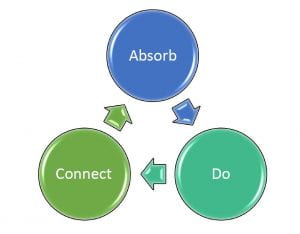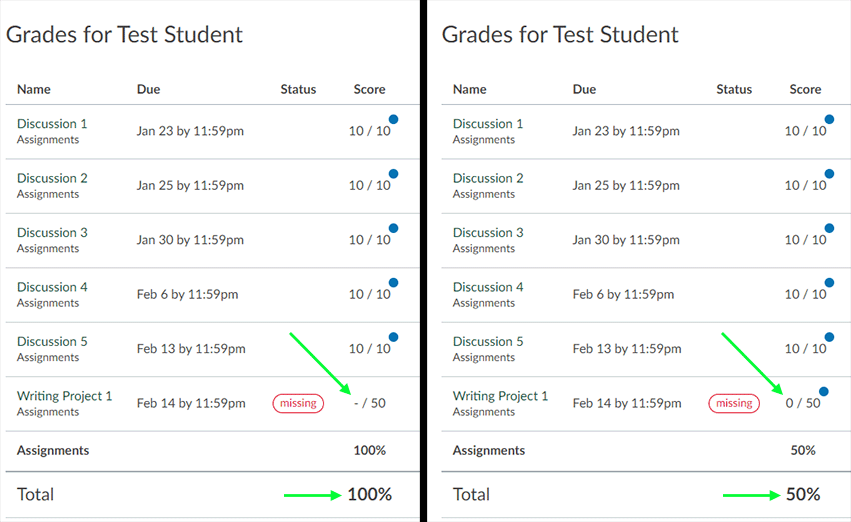In higher education, the effectiveness of teaching plays a significant role in how students engage with the material and achieve learning outcomes. One approach to structuring the course activities involves categorizing them into three distinct types: Absorb, Do, and Connect. By classifying activities this way and designing them intentionally to meet dynamic learning objectives, instructors can ensure a comprehensive and engaging learning experience for their students.
Absorb
Absorb activities are those where learners gain the information they need. Examples include videos, readings, or podcasts. Typically, absorb activities take less time in online classes than they do in face-to-face classes where lecture is a popular form of instruction.
Here are some common examples of absorb activities:
Presentations (slide shows, videos, demonstrations)
Presentations are usually best used when information can best be conveyed visually, and the presentation can help the learner visualize something that is difficult to convey by other means. Learners typically tune out after five or six minutes, so it is important to keep presentations concise.
Readings
Use reading activities to present complex and difficult information in a stable form for careful study by the learner. Reading activities are important for moving beyond memorizing and recalling information and they can be used to encourage learners to find and understand information. It is often useful to have reading activities available to students where they will need to use it (as a reference in responding to a discussion, for example).
Stories by a teacher
Stories told by a teacher can be a great way to make a point memorable. They can be a type of presentation and should also be constructed in an efficient way. When done by a teacher, storytelling is an absorb activity. When done by a student, it is often a connect activity.
Do
Do activities are where students practice their knowledge. These are similar to formative assessments. Typically, “do” activities have lower stakes and allow for students to have multiple attempts. The focus is on mastering new knowledge or skills. This is equivalent to doing basketball drills to prepare for a game.
Here are some common do activities as well as some best practices:
Practice activities
Drill and practice (e.g., worksheets, quizzes from a textbook publisher) are best used for foundational material that will be used again and again.
Hands-on activities might include performing a calculation with an on-screen calculator, completing a dialogue in a foreign language, or filling in a missing term in a piece of computer code.
Guided-analysis activities, such as an activity where agronomy students may be asked to classify soil based on a chart that shows the proportion of sand, silt, and clay in the soil.
Discovery Activities
Case studies are when an instructor presents a situation that requires learners to draw upon course knowledge to reckon with a complex problem. These are usually best used when instructors would like learners to draw upon multiple sets of knowledge, draw fine distinctions, and work with shades of meaning. Case scenarios are often good to use once students have mastered foundational concepts.
Games and Simulations
Similar to case studies, games can be a good way for learners to draw upon multiple sets of knowledge and draw fine distinctions. Games can also help stimulate learners’ curiosity.
Connect
Connect activities help learners close the gap between learning and the rest of their lives. They prepare learners to apply learning in situations they encounter at work, in later learning efforts, and in their personal lives. The purpose of these activities is not necessarily to learn something new — that is typically for absorb and do activities — but rather to link something that is already known or prompt an application of learning.
Here are some common connect activities as well as best practices:
Ponder activities
This type of activity requires learners to think deeply and broadly about a subject. Learners may answer rhetorical questions, meditate on a subject, identify or evaluate examples, summarize learning, or brainstorm ideas.
Questioning activities
Let learners fill knowledge gaps and resolve confusion by reserving time to ask questions of teachers, other experts, or fellow learners.
Stories by learners
These activities, which might take the form of a written reflection, in-class or online discussion, or oral presentation, let learners relate the subject matter to events in their own lives.
Research activities
Require learners to apply their knowledge while also discovering and using their own sources of information. These activities might include scavenger hunts and guided research.
Arraying Activities in a Sequence

Not every lesson will have a connect activity, but in general, it is good to plan activities so that students acquire information (absorb) and then practice information (do) and apply information (connect). A common example is for students to read a textbook (absorb) and discuss their knowledge in a Canvas discussion (do) in preparation for an exam (connect).
Sometimes these activities overlap. For example, embedding questions in a video is one way to have students practice their knowledge while they absorb it.
On other occasions, students may practice their knowledge ahead of absorbing it. For example, a pre-reading quiz or scavenger hunt can point students to important information in a complicated text. This way the instructor can help students filter out the information that they should spend their time absorbing.
Connect activities often come at the end of an absorb/do sequence as students are often practicing for activities such as group projects, speeches, exams, etc. Yet, there are other activities that students connect to course material. A student survey, for example, may ask students about their motivations for taking the class. This can be a subtle way to orient the student learning toward their lived experience. Similarly, reflective exercises can be done prior to a new unit of instruction or as a way to bridge two modules together. In this way, connect activities can be the glue that holds modules together while also forging bonds between the students and the course material.
The sequence of absorb, do, and connect activities is often linear, but it does not have to be. Whatever order you go in, it is important to ask: how will students acquire knowledge (absorb)? How will they practice (do), and how will they apply their knowledge (connect)? Finding activities that lead students through all three phases will help answer the question “what do we do in class?” whether that class is in-person, online, or somewhere in-between.
If you would like to connect on a more detailed discussion of use cases and how you can harness the Absorb, Do, Connect schema in your own course, you can schedule a consultation with CATL.
Reference
The absorb, do, connect schema comes from William Horton, E-Learning by Design, second edition, New York: Wiley Publishing, 2011. (Requires UWGB login.)
